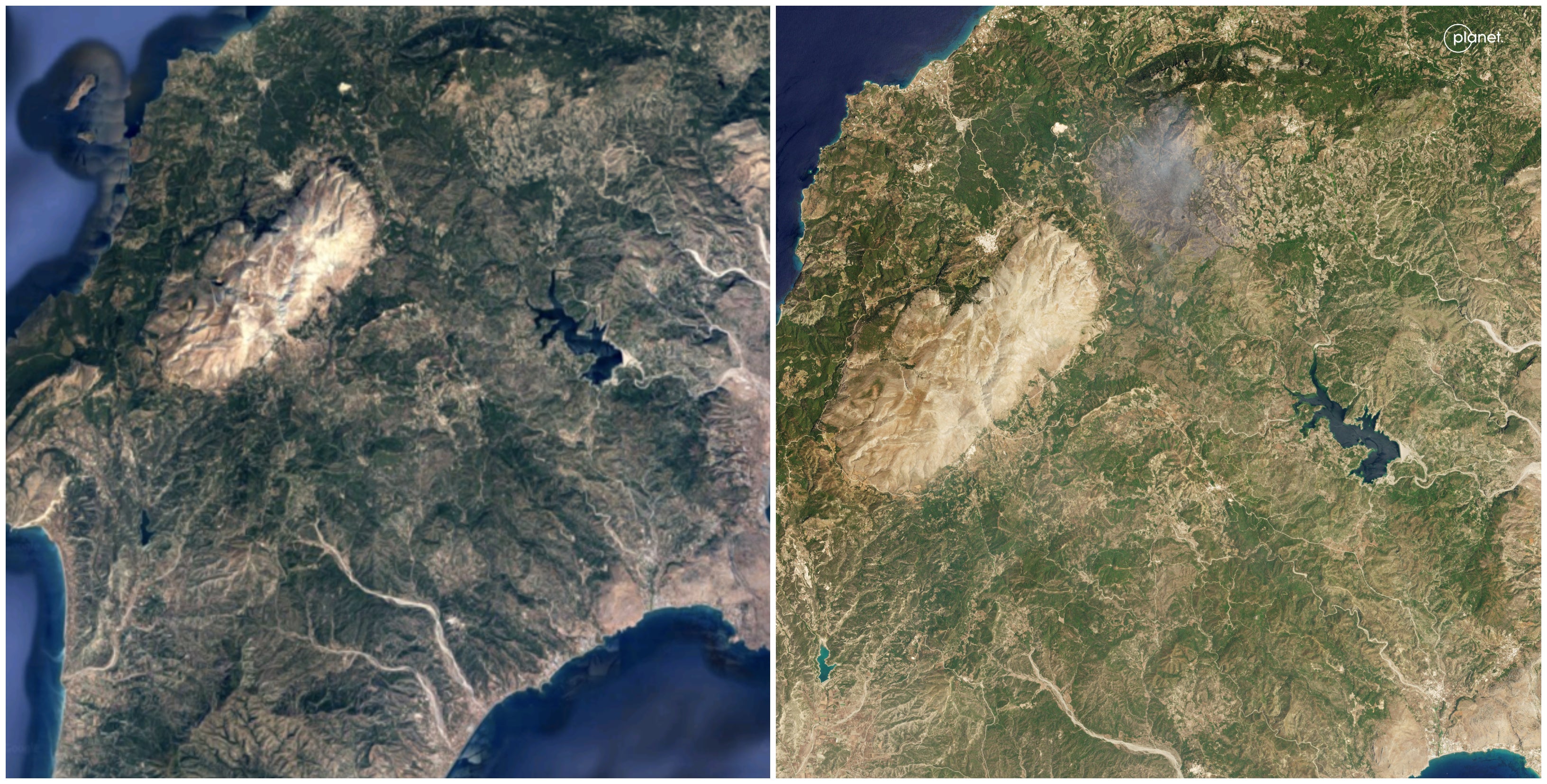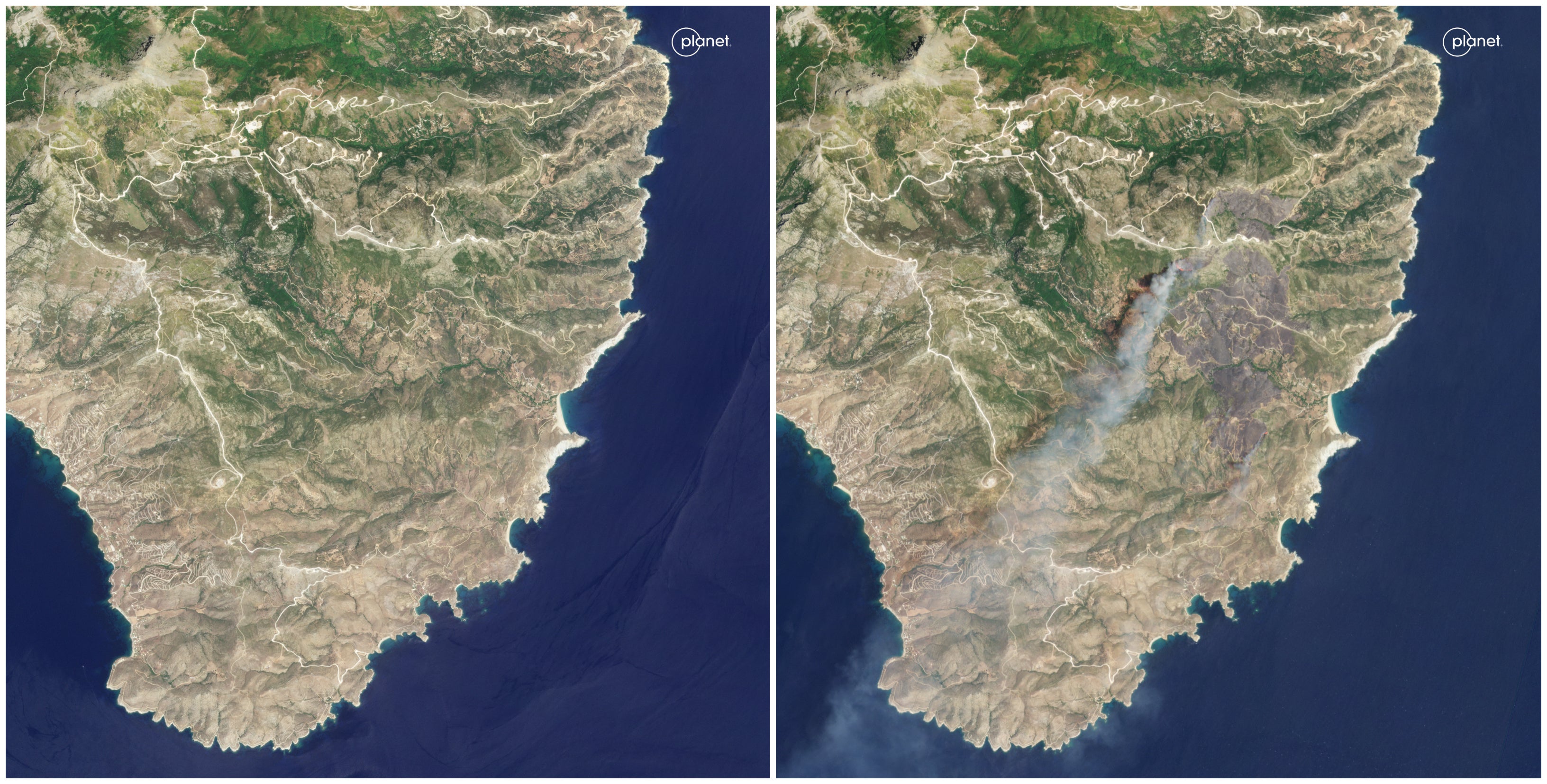Satellite images show how wildfires spread to engulf large parts of Greek islands
PM declares ‘we are at war’ as wildfire rips through popular Greek island during tourist season
Your support helps us to tell the story
From reproductive rights to climate change to Big Tech, The Independent is on the ground when the story is developing. Whether it's investigating the financials of Elon Musk's pro-Trump PAC or producing our latest documentary, 'The A Word', which shines a light on the American women fighting for reproductive rights, we know how important it is to parse out the facts from the messaging.
At such a critical moment in US history, we need reporters on the ground. Your donation allows us to keep sending journalists to speak to both sides of the story.
The Independent is trusted by Americans across the entire political spectrum. And unlike many other quality news outlets, we choose not to lock Americans out of our reporting and analysis with paywalls. We believe quality journalism should be available to everyone, paid for by those who can afford it.
Your support makes all the difference.More evacuations were ordered as the week-long wildfire on the Greek resort island of Rhodes tore past defences due to strong winds, leaving local residents in scrambles.
The latest evacuations were ordered after at least 19,000 people, mostly tourists, were moved in buses and boats as the fire reached resorts on Rhodes’s southeastern coast.
Satellite images revealed the extent of devastation caused by the wildfire which has charred the central part of the island, burning down homes, cars and livestock.

Images from 20 July show smoke billowing from only a small part of the island, whereas the satellite pictures taken just three days later reveal a massive portion of scorched land in the central part of the island.
About 10,000 British tourists are feared to be on the fire-scorched Greek island of Rhodes, a minister has warned.
An average of 50 new wildfires have broken out daily for the past 12 days in Greece, according to government spokesperson Pavlos Marinakis. Over the weekend 64 new blazes were recorded.

Ian Murison, a businessman from London on vacation in southern Rhodes, told Associated Press that he saw "flames coming over the hills".
“We all just took our cases and started walking. It was about 3km before we got out from underneath the ash cloud,” he said, adding that his family reached a nearby beach, where they waited with thousands of others to be evacuated in the dark due to a power blackout.

"You could see an orange glow in the sky and it got more and more, big balls of fire going into the sky."
The army said it was helping to set up temporary accommodation on Rhodes, where schools and sporting facilities were opened for the rescue operation.
The British foreign office has sent a team to Rhodes Airport to help with the repatriation of British nationals. Airlines and the tour operators Tui UK and Jet2 sent empty planes to the embattled island to bring back travellers after cancelling all flights to Rhodes until Friday, 28 July.
New fires forced authorities to order evacuation overnight on the western island of Corfu, where more than 2,000 people were moved to safety by land and sea.

Footage showed flames engulfing Corfu as smoke and orange haze covered the night skies. The fire broke out on the northern part of the island, popular with British tourists.
The island of Evia was the latest "nightmare" of tourists as a fire spread on Monday, while another blaze broke out in the middle of the island.
Parts of Evia, off central Greece's eastern coast, were also evacuated, while authorities told residents of four southern villages to evacuate to the town of Karystos to escape the advancing blaze.

Greek prime minister Kyriakos Mitsotakis during a debate in parliament declared: “We are at war – completely focused on the fires.”
“Over the coming days and weeks, we must remain on constant alert,” he said, highlighting the threat from climate change, which he added “will make its presence ever more felt with greater natural disasters throughout the Mediterranean region”.
Subscribe to Independent Premium to bookmark this article
Want to bookmark your favourite articles and stories to read or reference later? Start your Independent Premium subscription today.




Join our commenting forum
Join thought-provoking conversations, follow other Independent readers and see their replies
Comments